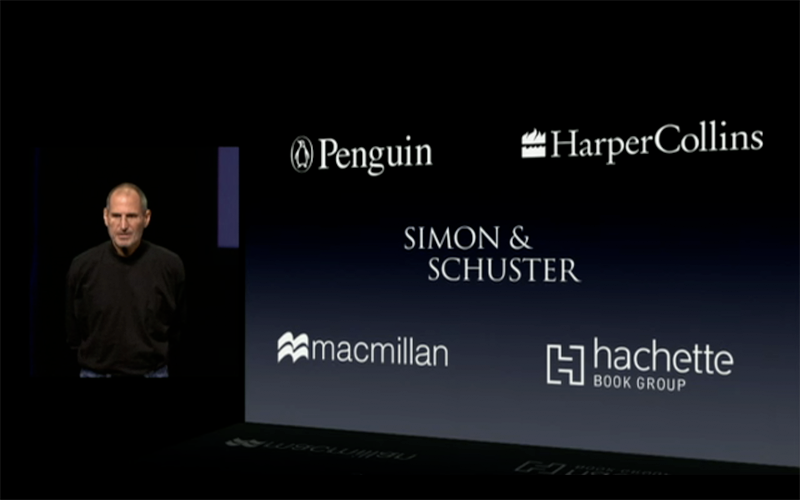Penguin to settle e-book price fixing allegations with DoJ
Late Apple cofounder Steve Jobs introduces iBooks iPad app and partner publishers in 2010. | Source: Apple

Last updated
Book publisher Penguin on Tuesday proposed a settlement with the U.S. Department of Justice regarding an ongoing antitrust investigation related to e-book price fixing, which leaves only Apple and Macmillan as remaining defendants.
The U.S. Justice Department confirmed in a statement that the Pearson Plc.-owned Penguin Group has proposed and filed a settlement in New York District Court which, if approved, would bring an end to the publisher's role in the antitrust lawsuit filed by the department in April. Under the agreement's terms, Penguin would end its current dealings with any e-book seller, including Apple, and will be barred for two years from signing deals with resellers which limit promotions or discounts.
In the civil suit, the DoJ accused five publishers and Apple over alleged e-book price-setting in the iBooks digital bookstore. Three of the publishing houses, Hachette, HarperCollins and Simon & Schuster, settled almost immediately, leaving only Penguin, Macmillan and Apple as defendants. With Tuesday's proposed agreement, Apple and Macmillan will stand alone against the DoJ's allegations.
“Since the department’s settlement with Hachette, HarperCollins and Simon & Schuster, consumers are already paying lower prices for the e-book versions of many of those publishers’ new releases and bestsellers,†said Chief of Staff and Counsel at the Department of Justice's Antitrust Division Jamillia Ferris. “If approved by the court, the proposed settlement with Penguin will be an important step toward undoing the harm caused by the publishers’ anticompetitive conduct and restoring retail price competition so consumers can pay lower prices for Penguin’s e-books.â€
At issue is the so-called agency model that Apple and its partner publishers used to set e-book prices in iBooks. Unlike Amazon's low-margin wholesale model, which lets retailers buy content in bulk and sell it at or below cost, the agency model allows publishers to set e-book pricing in a "most favored nations" agreement that forbids them from offering the same content to another reseller at a lower price. According to the DoJ, the model used by Apple and its partners falsely inflated the price of e-books.
The DoJ said it plans to move forward with litigation against Apple and Macmillan for "conspiring to raise e-book prices to consumers."
Tuesday's news comes just days after it was announced an identical European Union antitrust probe was officially terminated after Apple and four publishing houses agreed to loosen pricing restrictions on retailers for a period of two years.
 Mikey Campbell
Mikey Campbell













 Amber Neely
Amber Neely
 Thomas Sibilly
Thomas Sibilly
 AppleInsider Staff
AppleInsider Staff
 William Gallagher
William Gallagher
 Malcolm Owen
Malcolm Owen
 Christine McKee
Christine McKee










19 Comments
I don't understand Amazon's business model of selling below cost.
I don't understand Amazon's business model of selling below cost.
They make it up in volume.
So why was it, again, that Amazon is allowed to do whatever they want but when Apple comes to remove Amazon's monopoly they're accosted and sued?
Quote:
I don't understand Amazon's business model of selling below cost.
They make it up in volume.
You can make up for small margins with volume. You cannot make up for losses with volume (unless you're talking about volume in other merchandise). Amazon's business model is actually similar to that of Facebook or Google - provide service or goods at very low margin, at a loss or even for free in order to bait you into their ecosystem, then a two-way training relationship begins. They learn about your likes and dislikes based on your behavior (including the data and metadata you provide). At the same time, they also steer you around their ecosystem in order to (a) keep you there as long and as often as possible, and (b) to train you to generate and provide them more data and metadata about yourself. Of course, the final piece of the puzzle is to monetize that knowledge. Pundits criticize Google and Facebook as if they are the first offenders in this realm. But Amazon beat them to it. Long ago, they had a system in place that started with your registration. With every book or product you bought or even perused, they were accumulating data on you. Because we didn't upload photos or other conventionally personal information, we didn't realize the entrapment was taking place. Now, it's quite clear.
All to say, Amazon, Google and Facebook are three sides of the same coin. Not that I see anything wrong with it.
So why was it, again, that Amazon is allowed to do whatever they want but when Apple comes to remove Amazon's monopoly they're accosted and sued?
IMO, this is why: Amazon used bully tactics to make their pricing scheme work. Apple "colluded" with the publishers. Collusion, in whatever guise, is frowned upon, even if it is about cooperating to defeat a bully.
Dear DOJ, Amazon had a monopoly and used anti-competitive practices to drive business away from other ebook resellers and physical book resellers.
Dear DOJ, Amazon had a monopoly and used anti-competitive practices to drive business away from other ebook resellers and physical book resellers.
"La la la, not listening, Apple makes news, la la la…"
Sort of shocking when even your government only goes after the companies that make news, eh?